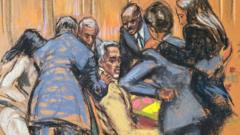The ongoing legal battles involving Fat Joe, Sean "Diddy" Combs, and Jay-Z's Roc Nation have sparked scrutiny over potential connection to efforts aimed at silencing dissent within the industry.
**Legal Turmoil Surrounding Fat Joe and Roc Nation Intensifies**

**Legal Turmoil Surrounding Fat Joe and Roc Nation Intensifies**
A lawsuit against Fat Joe and Roc Nation raises questions about possible misconduct within the famed hip-hop agency.
The legal landscape continues to shift dramatically as Joseph Cartagena, widely known as Fat Joe, finds himself embroiled in a lawsuit along with Jay-Z's Roc Nation. A detailed 157-page complaint, filed on June 19, 2025, implicates not only Fat Joe but also the legal team representing Roc Nation, led by Joe Tacopina. The lawsuit sheds light on recent incidents that raise serious concerns about the integrity of the legal representation involved.
Notably, the arrest of Terrance Dixon’s attorney, Tyrone Blackburn, has drawn public attention and led to speculation about the motives behind such an event. Former Roc-a-Fella artist Choke No Joke suggests that Tacopina and Roc Nation's influence may extend to orchestrating an attempt to intimidate or silence Dixon’s legal team. This assertion joins a growing chorus of criticisms against Roc Nation, which some observers have begun to label a “criminal enterprise” due to the series of allegations it faces from various figures in the music industry.
Compounding the drama, legal representatives associated with Roc Nation, such as Tacopina, and his colleague Alex Spiro, have faced accusations that include unauthorized practice of law and intimidating victims and witnesses. Such allegations have drawn public outrage, particularly in light of the media’s role in broadcasting narratives that appear to favor Roc Nation's interests.
Media organizations like Harvey Levin’s TMZ, accused by some of acting as a “propaganda machine,” have been quick to provide platforms for Tacopina. This situation has been exacerbated by the legal system’s scrutiny, as Judge Subramanian warned against the potential manipulation of media narratives during Diddy’s federal trial.
Beyond their representation of high-profile clients—such as A$AP Rocky and Meek Mill—what lies ahead for Tacopina and Spiro is uncertain as controversies mount. The lawsuit against Fat Joe is not just a matter of legal accountability; it is a reflection of the contentious dynamics at play within the hip-hop community, and the implications of artist affiliations with powerful legal entities like Roc Nation.
Through a detailed investigation, the narrative suggests a broader systemic issue within the hip-hop industry, raising questions about transparency, justice, and the role of media in shaping public perception. As this legal drama continues to unfold, observers and insiders alike are left contemplating the potential consequences for those involved.
For further insights and updates regarding this evolving story, interested parties are encouraged to reach out and share information via email or secure communication platforms.
Notably, the arrest of Terrance Dixon’s attorney, Tyrone Blackburn, has drawn public attention and led to speculation about the motives behind such an event. Former Roc-a-Fella artist Choke No Joke suggests that Tacopina and Roc Nation's influence may extend to orchestrating an attempt to intimidate or silence Dixon’s legal team. This assertion joins a growing chorus of criticisms against Roc Nation, which some observers have begun to label a “criminal enterprise” due to the series of allegations it faces from various figures in the music industry.
Compounding the drama, legal representatives associated with Roc Nation, such as Tacopina, and his colleague Alex Spiro, have faced accusations that include unauthorized practice of law and intimidating victims and witnesses. Such allegations have drawn public outrage, particularly in light of the media’s role in broadcasting narratives that appear to favor Roc Nation's interests.
Media organizations like Harvey Levin’s TMZ, accused by some of acting as a “propaganda machine,” have been quick to provide platforms for Tacopina. This situation has been exacerbated by the legal system’s scrutiny, as Judge Subramanian warned against the potential manipulation of media narratives during Diddy’s federal trial.
Beyond their representation of high-profile clients—such as A$AP Rocky and Meek Mill—what lies ahead for Tacopina and Spiro is uncertain as controversies mount. The lawsuit against Fat Joe is not just a matter of legal accountability; it is a reflection of the contentious dynamics at play within the hip-hop community, and the implications of artist affiliations with powerful legal entities like Roc Nation.
Through a detailed investigation, the narrative suggests a broader systemic issue within the hip-hop industry, raising questions about transparency, justice, and the role of media in shaping public perception. As this legal drama continues to unfold, observers and insiders alike are left contemplating the potential consequences for those involved.
For further insights and updates regarding this evolving story, interested parties are encouraged to reach out and share information via email or secure communication platforms.






















